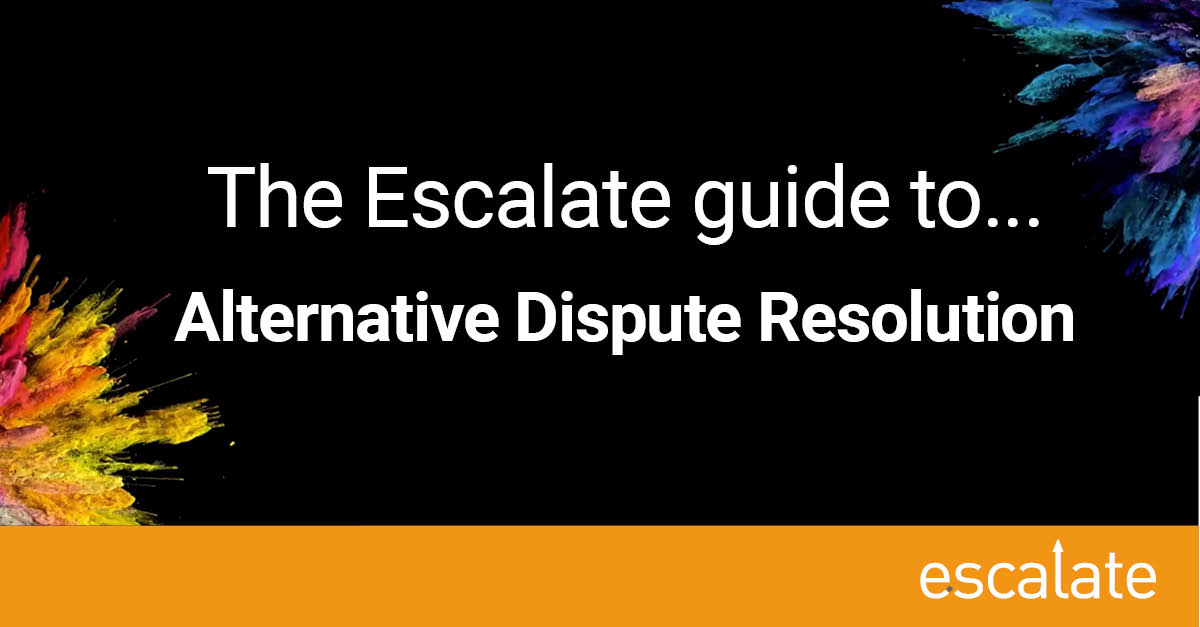As the name suggests, Alternative Dispute Resolution (often abbreviated to ADR) is a method of settling a dispute without going to court. It’s a less stressful, commercially viable solution which helps avoid the full litigation process, and on a practical level usually saves time and money by helping both parties reach a resolution sooner.
ADR has become an increasingly popular and viable solution for resolving disputes away from the courtroom in recent years, particularly as the average time for cases to reach court reaches record highs.
In the UK, there are four types of alternative dispute resolution which are most frequently used.
Types of Alternative Dispute Resolution
Alternative Dispute Resolution covers a wide range of techniques which help parties involved in a dispute to reach a negotiated settlement, without resorting to Court proceedings.
The most common methods of ADR include:
- Mediation
- Adjudication
- Expert opinion
- Mini trial
There are other types of alternative dispute resolution, but Escalate will always advise you on the best procedure based on your circumstances.
Mediation
Mediation is the most common form of ADR, with an independent third party mediator that meets the parties separately, and shuttles between them, trying to establish common ground and proposing ways of resolving the dispute. The mediation process is non-binding, and both parties are free to walk away should an agreement not be reached.
Adjudication
Adjudication is a statutory procedure which is designed to be quicker and more cost effective than litigation or arbitration. Each party has a right to have a dispute decided by an adjudicator, who must generally decide the dispute in less than 42 days. This method is normally used to ensure payment, and any decision is binding and usually upheld by the Courts.
Expert opinion
The parties appoint an agreed expert and ask them to consider particular points of dispute between the parties, usually of a technical nature. The parties can either agree in advance to be bound by the expert’s conclusions, or simply to use the expert’s conclusions as a guide for further negotiation, discussion or further expert analysis.
Mini trial
A mini trial, or ‘executive tribunal’, is a more formal type of mediation hearing. Presentations are made to a panel which would typically comprise the mediator and a senior executive from each party. Following the presentations, the executives will attempt to settle the case with the assistance of the mediator if necessary.
New changes to Alternative Dispute Resolution
From 1st October 2024 a monumental change to ADR’s status and role in the civil justice system came into effect. These amendments to the Civil Procedure Rules (CPR) promote its usage, which will see litigants who refuse to participate in alternative dispute resolution without good reason penalised by the High Court when it comes to allocating costs.
The new rules are outlined as follows:
Increased powers to order parties to engage in alternative dispute resolution
- “Promoting or using alternative dispute resolution” is now explicitly stated as one of the overriding objectives of civil justice.
- Broadened general case management powers to include the Court’s authority to “order the parties to engage in alternative dispute resolution.”
- The use of ADR is no longer just encouraged, but has expanded to form part of the Court’s duty by “ordering or encouraging the parties to use, and facilitating the use of, alternative dispute resolution” through active case management.
Court directions must account for whether to order or encourage ADR
- Requirements to consider “whether to order or encourage the parties to engage in alternative dispute resolution” when issuing directions for fast-track, intermediate-track, and multi-track claims.
Cost penalties for refusing to participate in ADR
- The conduct of each party will be under more intense scrutiny when the Court is determining whether to issue a costs order, amongst other relevant circumstances. This includes “whether a party failed to comply with an order for alternative dispute resolution, or unreasonably failed to engage in alternative dispute resolution.”
Alleviating the heavy backlogs in the court system are another reason why there’s an increased emphasis on mediation within civil justice, so that cases can avoid the courts altogether and be concluded through ADR instead.
ADR rulings in practice: What happens if either party refuses to engage?
Outright refusal to engage in alternative dispute resolution has always been viewed dimly by the courts, but the most recent changes sends a clear message to litigants that participation is no longer optional, or a step to bypass without reasonable justification. The move towards increased usage of ADR and mediation points towards a cultural shift in attitudes – it’s now an integral part of the civil justice process.
In a landmark October 2024 media law case involving a disgraced former MP vs The Times newspaper, Ms Justice McCloud ruled that parties’ willingness to engage in ADR would be taken into account when awarding with costs: “Any party which decides not to engage in ADR… or to ‘call it off’ must be in a position to justify that non-engagement to the Costs Judge”.
Although this case was related to media law, it suggests that wider implications across commercial litigation will follow suit. The precedent was already set with 2023’s Churchill v Merthyr Tydfil ruling which established the court’s ability to order parties to engage in ADR, and the most recent CPR changes further embed alternative dispute resolution into the justice system.
Benefits of Alternative Dispute Resolution
The most obvious benefit alternative dispute resolution offers is that it often saves time and cost compared to the traditional Court route, and when successful can secure a favourable early settlement.
It affords both parties more flexibility, choice and control in resolving a dispute. For example, in mediation the parties agree the mediator or expert, the venue, timetable, procedure and the agenda. Each party is able to determine what information is disclosed to the other side, and if a case is less robust than anticipated, ADR helps to limit risk exposure.
The entire ADR process is private, so potentially unwelcome publicity can be avoided, and any agreed settlement will not set a precedent.
It can also be arranged within days or weeks, rather than the usual months or years in conventional litigation or arbitration. Typically, the average case is resolved in less than a day – far less time than the average of 18 months that it normally takes to settle a litigation case.
Finally, ADR promotes creative, flexible solutions to a dispute, and is particularly beneficial when traditional negotiation techniques are not producing a result.
The disadvantages of Alternative Dispute Resolution
- There’s no guarantee that alternative dispute resolution will lead to a resolution, meaning that the case may end up going to trial anyway.
- Not every fact may have been fully disclosed – there’s no equivalent of disclosure in the ADR process, which could lead to some facts being omitted.
- It’s not usually legally binding, with the exception of arbitration.
It’s clear that the ‘Alternative’ title in ADR is no longer fitting, as it instead shifts towards a mainstream, enforceable tactic in the dispute resolution process.
Escalate has successfully used alternative dispute resolution to resolve numerous disputes and recover money owed to our clients in a wide range of cases, including breach of contract, transactions at an undervalue and shareholder disputes.
Our experienced team understands that being involved in a dispute can be a fraught and anxious time, and that resolving them as quickly as possible in a cost-effective manner is essential to minimise business disruption. We’ve already unlocked millions for SMEs caught up in legal disputes through our unique, fully-funded solution, which targets a rapid settlement with no upfront fees and nothing to pay in the event the case loses.
To find out more, download the Escalate Guide to Alternative Dispute Resolution.
If you’d like to get in touch with one of the Escalate team to discuss using Alternative Dispute Resolution to resolve a commercial dispute, please contact us on 0207 039 1950 or email us.
< News & Views
CONTACT US
Contact Us to find out more about how Escalate can help your business.
Exchange Station, Tithebarn Street, Liverpool,
L2 2QP (Registered office)
London office: 5th floor, 15 Westferry Circus, London, E14 4HD
Escalate Law Limited
Company No: 10381993
Authorised and regulated by the Solicitors Regulation Authority
Escalate Law Limited (No: 650666)

